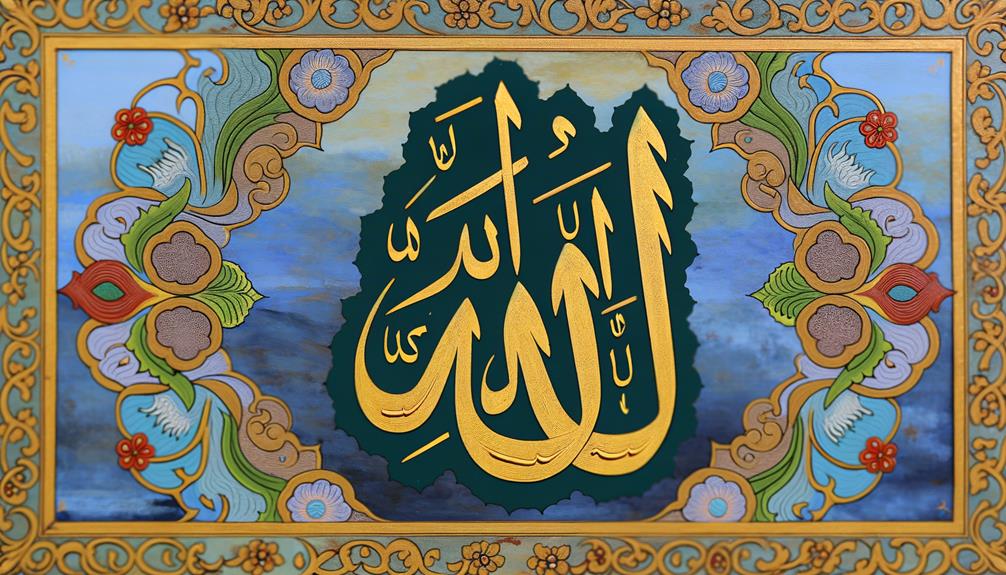Allah Name and Meaning in Urdu
In Urdu, 'Allah' is written as اﷲ, translating to 'The God.' It signifies the singular, all-powerful deity, embodying the essence of Tawhid, or the oneness of God. The name 'Allah' carries profound spiritual significance and is pivotal in daily prayers and rituals.
It's deeply embedded in the fabric of Urdu-speaking cultures, shaping greetings, literature, and art. Common phrases like 'Insha'Allah' (If Allah wills) and 'Alhamdulillah' (Praise be to Allah) reflect a deeper connection to faith.
To enrich your understanding of Allah's divine attributes and cultural impact, there's much more to explore.

Key Takeaways
- Allah, written as اﷲ in Urdu, means 'The God' and signifies monotheism.
- The term embodies the essence of Tawhid, the oneness of God, fundamental to Islamic belief.
- Attributes like Ar-Rahman (The Compassionate) and Al-Hakim (The Wise) enrich understanding of Allah's nature.
- Common phrases like Insha'Allah, Alhamdulillah, and SubhanAllah reflect reliance, gratitude, and admiration for Allah.
- These phrases and attributes enhance spiritual connection and cultural identity among Urdu-speaking Muslims.
Significance of 'Allah' in Islam
From the earliest revelations to the present day, the name 'Allah' holds unparalleled significance in Islam as it represents the one and only God, the Creator and Sustainer of the universe.
When you utter the name 'Allah', you're invoking the highest power acknowledged in Islamic faith. This name transcends linguistic barriers and cultural contexts, uniting Muslims worldwide in their devotion.
It's not just a name but a profound declaration of monotheism, emphasizing the indivisibility and omnipotence of God. The reverence for 'Allah' is deeply embedded in daily prayers, rituals, and the spiritual lives of Muslims.
Recognizing the importance of this name helps you understand the core of Islamic theology and the essence of a Muslim's faith.
Literal Meaning in Urdu
In Urdu, the name 'Allah' is written as ال\u064ہ and means 'The God,' highlighting His singularity and supreme authority. This term encapsulates the essence of monotheism, emphasizing that there's no deity except Allah.
When you see ال\u064ہ, you're reminded of the unique and unparalleled nature of the Divine. The prefix 'Al-' signifies 'The,' underscoring that Allah isn't just any god but the one and only supreme being.
In Urdu script, the elegance of ال\u064ہ conveys both reverence and awe. Understanding this literal meaning helps you grasp the fundamental concept of Tawhid, the oneness of God, which is central to Islamic belief.
This recognition is essential for deepening your spiritual comprehension.
Spiritual Connotations in Urdu
When you explore the spiritual connotations of Allah's name in Urdu, you'll uncover profound divine attributes that shape Islamic theology.
This exploration offers insights into the cultural significance of these attributes and their impact on daily life and worship.
Additionally, understanding the linguistic nuances in Urdu enriches your appreciation of the depth and beauty inherent in Allah's name.
Divine Attributes Explained
The divine attributes of Allah, each carrying profound spiritual connotations, are eloquently expressed in the rich tapestry of the Urdu language. You'll find that these attributes not only deepen your understanding but also evoke a sense of reverence and connection.
| Attribute (Urdu) | Meaning |
|---|---|
| الرحمن (Ar-Rahman) | The Most Merciful |
| الرحیم (Ar-Raheem) | The Most Compassionate |
| الملك (Al-Malik) | The King |
| القدوس (Al-Quddus) | The Most Holy |
| السلام (As-Salam) | The Source of Peace |
Understanding these attributes in Urdu can elevate your spiritual journey, allowing you to grasp the depth of Allah's nature. Each name invites you to reflect deeply and embrace the divine qualities in your own life.
Cultural Significance Highlighted
Exploring the cultural significance of Allah’s names in Urdu reveals a profound tapestry of spiritual connotations that resonate deeply within the hearts of believers. The names of Allah in Urdu hold a special place in the hearts of believers, carrying with them a rich history and deep meaning. Each name reflects a different aspect of Allah’s character and attributes, allowing believers to connect with Him on a personal level. The ibrahim name meaning, for example, speaks to Allah’s role as the Merciful and the Compassionate, providing comfort and guidance to those who seek His presence in their lives.
Each name, imbued with divine attributes, serves as a source of solace, guidance, and strength. When you invoke names like 'Al-Rahman' (The Most Merciful) or 'Al-Ghaffar' (The Ever-Forgiving), you're not just uttering words; you're connecting with the Divine on a deeply personal level.
These names, recited in prayers and daily interactions, foster a continuous awareness of Allah's presence. They also cultivate virtues such as compassion, patience, and humility.
Linguistic Nuances Explored
Urdu's rich linguistic heritage infuses Allah's names with layers of spiritual connotations that invite deeper reflection and connection. You'll find that each name carries profound meanings, not just in its translation but in its phonetics and etymology.
For instance, 'Ar-Rahman' and 'Ar-Rahim' derive from the root word 'Rahm,' signifying mercy and compassion, reflecting Allah's boundless grace. Understanding these names in Urdu deepens your spiritual insight, offering a more intimate bond with the divine.
The poetic nature of Urdu adds a melodious reverence to these names, enhancing your spiritual experience. By exploring these nuances, you don't just learn the names; you embody their essence, allowing for a more profound, personal connection to Allah.
Cultural Impact in Urdu-Speaking Regions
In Urdu-speaking regions, the name Allah holds profound cultural significance, influencing daily life, language, and traditions. You'll notice its presence in greetings, such as 'As-Salamu Alaikum' (Peace be upon you), which invokes divine blessing.
The name Allah permeates poetry, literature, and art, reflecting deep spiritual and cultural roots. Festivals like Eid are celebrated with prayers and expressions of gratitude to Allah, reinforcing communal bonds.
The call to prayer, Adhan, echoes through the streets five times a day, reminding believers of their devotion. Even in moments of adversity, phrases like 'Insha'Allah' (God willing) provide comfort and hope.
This cultural immersion fosters a sense of unity and identity among Urdu speakers, enriching their everyday experiences.
Attributes of Allah in Urdu
When you explore the attributes of Allah in Urdu, you'll encounter terms like صفاتِ باری تعالی and الوہیت کی خصوصیات.
These attributes, including Allah کی نمایاں صفات, signify His supreme qualities and characteristics.
Understanding these attributes deepens your reverence and connection to the divine.
صفاتِ باری تعالی
Through understanding the صفاتِ باری تعالی (Attributes of Allah) in Urdu, you gain a deeper appreciation of His infinite qualities and their profound significance in your daily life.
Recognizing these attributes can transform your perspective and bring you closer to Him. Consider these attributes:
- الرحمن (Ar-Rahman): Reflect on His boundless mercy that encompasses all of creation.
- الحَكِيم (Al-Hakim): Contemplate His wisdom, guiding you through life's complexities.
- العَزِيز (Al-Aziz): Acknowledge His unmatched power, providing strength in times of need.
الوہیت کی خصوصیات
Understanding the attributes of Allah in Urdu illuminates His divine essence and strengthens your spiritual connection. Recognizing these characteristics helps you comprehend the profound nature of Allah.
For instance, His omnipotence signifies that Allah holds unlimited power over all things. His omniscience means He knows everything, past, present, and future. His omnipresence indicates that Allah exists everywhere, transcending time and space.
These attributes contribute to a deeper understanding of His boundless mercy, justice, and wisdom. By reflecting on the attributes, you gain insight into His perfection and majesty, fostering a stronger faith.
This understanding is essential for nurturing your relationship with Allah and adhering to His guidance in all aspects of life.
اللہ کی نمایاں صفات
Reflecting on the attributes of Allah (اللّٰہ کی نمایاں صفات) in Urdu deepens your understanding of His infinite qualities and fosters a more profound spiritual connection. Each attribute reveals a unique aspect of His divine nature, guiding you towards a life of faith and devotion.
Consider these three attributes:
- رحمن (Ar-Rahman) – The Most Merciful: Feel His boundless compassion embracing you in every hardship.
- رحیم (Ar-Raheem) – The Most Compassionate: Let His enduring kindness inspire your actions.
- ملک (Al-Malik) – The Sovereign: Acknowledge His supreme authority over all creation and find peace in His rulership.
Contemplating these attributes strengthens your faith and deepens your spiritual awareness, bringing you closer to the Divine.
Common Phrases Including 'Allah
You'll often hear the name 'Allah' in various common phrases that hold deep religious significance and are frequently used in daily conversations among Urdu speakers.
For instance, 'Insha'Allah' means 'If Allah wills' and is used to express hope for the future.
'Alhamdulillah' translates to 'Praise be to Allah,' often said in gratitude.
'SubhanAllah' means 'Glory be to Allah,' reflecting awe or amazement.
'Astaghfirullah' is a plea for forgiveness, meaning 'I seek forgiveness from Allah.'
These phrases aren't just words; they reflect a deep connection to faith and spirituality.
Conclusion
To sum up, understanding 'Allah' in Urdu deepens your connection to its profound spiritual, cultural, and linguistic layers.
You've explored its literal meaning, spiritual connotations, and cultural impact, revealing its vast significance.
By delving into the attributes and common phrases, you're now well-equipped to appreciate the depth of 'Allah' in Urdu.
Remember, this knowledge is a key to open doors to a richer, more nuanced understanding of Islamic faith and practice.






